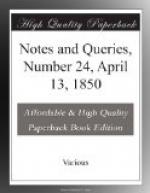J.
* * * * *
QUEVEDO—SPANISH BULL-FIGHTS.
The clear and satisfactory reply that “MELANION” received in No. 11. to his query on the contradictions in Don Quixote, tempts me to ask for some information respecting another standard work of Spanish literature, written by a cotemporary of the great Cervantes.
How is it, that in the Visions of Don Quevedo, a work which passes in review every amusement and occupation of the Spanish people, the national sport of bull-fighting remains entirely unnoticed?
The amusement was, I presume, in vogue during the 16th and 17th centuries; and the assignations made, and the intrugues carried on, within the walls of the amphitheatre would have supplied many an amusing, moralising penitent, male and female, to the shades below—the “fabulae manes” with whom Quevedo held converse. As my copy of the Visions is an anonymous translation, and evidently far from being a first-rate one, I shall not be surprised if I receive as an answer,—“Mistaken as to your fact, read a better translation:” but as in spite of its manifold, glaring defects, I have no reason to suspect that the text is garbled, I think I may venture to send the query.
In “Vision 7.” I find Nero accusing Seneca of having had the insolence to use the words, “I and my king.” I have often heard of Henry VIII., Wolsey, and “Ego et rex meus;” but as I never heard Quevedo quoted as an illustration, I look upon this as one of the suspicious passages in my copy of his work.
C. FORBES.
Temple.
* * * * *




